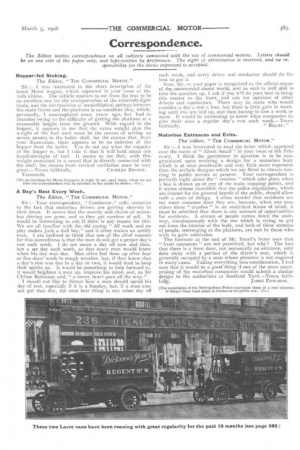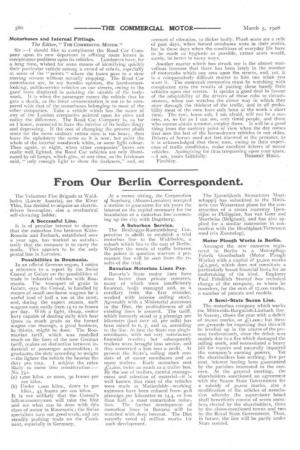Correspondence.
Page 17

Page 18

If you've noticed an error in this article please click here to report it so we can fix it.
Hoppor-Ted Stoking.
The Editor, "Ti-is COMMERCIAL Murcia."
Sir :was interested in the short description of the
Latest Mann wagon, which appeared in your issue of the 20th ultimo. The vehicle appears to me from the text to be an excellent one for the transportation of the relatively-light loads, and the interposition of semi-elliptical springs between the main frame and the platform is an excellent idea, which, personally, I contemplated some years ago, but had to abandon owing to the difficulty of getting the platform at a reasonable height from the ground. With regard to the hopper, it appears to me that the extra weight plus the weight of the fuel used must be the means of setting up severe strains in the boiler shell, for the reason that, from your illustration, there appears to he no isolation of the hopper from the boiler. You do not say what the capacity of the hopper is, but I take it that it will hold about one hundredweight of fuel. It seems to me that, with this weight contained in a vessel that is directly connected with the shell, the strains from vertical oscillation must be very
great.—Yours faithfully, CHARLES BROWN. Yarmouth.
[We are inviting the Mann Company to reply in our next issue, when we are sure our correspondent will be satisfied on the points he raises.—En.] A Day%-. Rest Every Week.
The Editor, "THE COMMERCIAL Mama."
Sir :—Your correspondent, " Conductor," calls attention to the fact that motorbus drivers are getting slovenly in their dress. It seems that the novelty and charm of motorbus driving are gone, and so they get careless of self. It would be interesting to ask if there is any reason for this. We are all familiar with the old saying " All work and no play makes Jack a dull boy," and it often makes an untidy man. I am inclined to think that one of the chief reasons for this slovenliness is that the men do not get a proper day's rest each week. I do not mean a day off now and then, but a set day each week, so that every man would know when his day was due. Men often feel done up after four or five .days' work in rough weather, but, if they knew that a day's rest was due in a day or two, it would tend to keep their spirits up. It would be something to look forward to, it would brighten a man up, improve his mind, and, as Sir Clifton Robinson said, " a merry heart goes all the w11 "
I should not like to dictate how a man should spend his day of rest, especially if it is a Sunday, but, if a man cannot get that day, the next best thing is any other day off each week, and every driver and conductor should du his: best to get it.
Now, Sir, as your paper is recognised as. the official organ of the commercial motor world, and as such is well able to take the question up, I ask if you will do your best to bring this matter to the front, and ask for opinions of other drivers and conductors. There may be some who would consider a day's rest a loss, but there is little gain in working until you are laid up, and then having to lose a week or more. It would be interesting to know what companies do give their men a regular day's rest each week.—Yours
faithfully, " RELIEF."
Motorbus Entrances and Exits.
The' ',editor, "THE COMMERCIAL MOTOR."
Sir :—I was interested to read the letter which appeared over the name of " Albert Small " in your issue of 6th February. I think the gentleman in question is to be congratulated upon evolving a design for a motorbus body which is at once practicable and very little more expensive than the archaic designs which we see fitted to chassis running in public service at present. Your correspondent is perfectly right about the " crushes " which take place when a bus is drawn up at any of the main stopping points, and it seems almost incredible that the police regulations' which are framed for the general benefit of the public, should allow such a state of things. I often wonder that accidents are not more common than they are, because, when one considers these " crushes " in an analytical frame of mind, it must be admitted that there is any amount of opportunities for accidents. A stream of people comes down the stairway, simultaneously with the one which is trying to get out from the interior of the body, and both of these streams of people, converging at the platform, are met by those who wish to gain admission.
The footnote at the end of Mr. Small's letter says that " front entrances " are not permitted, but why? The factthat there is a front door, not necessarily an entrance', onlydoes away with a portion of the driver's seat, which is generally occupied by a man whose presence is not required in many cases. Taking everything into consideration, I feel' sure that it would be a good thing if one of the more enterprising of the motorbus companies would submit a similar. design to the authorities at .Scotland Yard.—Yours fully, jAmEs EDwARDs.
[The experience of the Metropolitan Pollee convinces them of a real element.. of danger from front steps or entrances for public use.—En.]
Motorbuses and Internal Fittings.
The Editor," THE COMMERCIAL MOTOR."
Sir :—I should like to compliment the Road Car Company upon its new departure in affixing route letters in conspicuous positions upon its vehicles. Londoners have, for a long time, wished for some means of identifying quickly their particular vehicle among a crowd of others, especially at some of the " points " where the buses pass in a slow moving stream without actually stopping. The Road Car motorbuses are, in my humble opinion, the handsomestlooking, public-service vehicles on our streets, owing to the good taste. displayed in painting the outside of the bodywork 1 is when the passenger enters the vehicle that he gets a shock, as the inner ornamentation, is not to he compared with that of the motorbuses belonging to most of the other companies. Take a vehicle which has the name of any of the London companies painted upon its sides and notice the difference. The Road Car Company is, as far as I know, contented to have the interior of its bodies dingy and depressing. If the cost of changing the present plush seats for the more sanitary rattan cane is too heavy, then leave the upholstery the same as it is now, but paint the whole of the interior woodwork white, .or some light colour. Then again, at night, when other companies' buses are really well lighted, the Road Car vehicles are only illuminated by oil lamps, which give, at any time, as the Irishman said, " only enough light to show the darkness," and, on account of vibration, to flicker badly. Plush seats are a relic of past days, when horsed omnbuses were in their zenith, but in these clays when the conditions of everyday life have to be made as hygienic as possible, rattan seats would, surely, he better in many ways.
Another matter which has struck me is the almost marvellous increase that there has been lately in the number of motorcabs which one sees upon the streets, and, yet, it is a comparatively difficult matter to hire one when you want it. The motorcab companies must be watching with complacent eyes the results of putting these handy little vehicles upon our streets. It speaks a good deal in favour of the adaptability of the drivers of these cabs to. circumstances, when one watches the clever way in which they steer through the thickest of the traffic, and in all probability most of the men have only been at the work a short time. The taxi, horse cab, I am afraid, will not he a success, as, so far as I can see, only timid people, and those who cannot obtain a motor, employ them. It will be a good thing from the sanitary point of view when the day comes that sees the last of the horse-drawn vehicles in our cities. Drivers of horses need not feel alarmed at the prospect, as it is acknowledged that these men, owing to their experience of traffic conditions, make, excellent drivers of motor vehicles. Apologising for thus trespassing upon your space. —I am, -yours faithfully, HERBERT HOGG. Finchle.y.
























